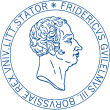Anton Elter
Anton Elter (born March 5, 1858 in Rosbach an der Sieg ; † November 5, 1925 in Bonn ) was a German classical philologist who worked as a professor at the universities of Czernowitz (1887-1890) and Bonn (1890-1925).
Life
Anton Elter was the oldest of the nine children of elementary school teacher Ludwig Elter and his wife Sophie (nee Stein). He grew up with his three brothers and five sisters in Rosbach and Lohmar. He attended elementary school and learned Latin and Greek through private lessons. From 1870 he attended the Progymnasium in Siegburg and from 1874 the Kaiser-Wilhelm-Gymnasium in Cologne . After graduating from high school in 1876, he first studied for one semester at the Münster Academy and then moved to Bonn , where he was particularly influenced by Franz Bücheler and Hermann Usener . In Bonn, Elter was a member of the philological seminar for four semesters, including two semesters as senior. Under Jacob Bernays he worked for the last four semesters of his studies as an assistant at the university library. On August 14, 1880 he was with the dissertation De Ioannis Stobaei codice Photiano doctorate .
After completing his studies, Elter went on an educational trip to Rome, where he took up a position as a private tutor to the Prince of Teano, Onorato Caetani, in the fall. In addition to this activity, Elter found the opportunity to study manuscripts in the Vatican Library and to get to know Roman life. In 1884 Elter returned to Bonn and prepared for the state examination for the higher teaching post, which he passed in autumn 1885. After the probationary year at the Royal High School in Bonn, Elter worked there as a teacher until he was appointed as an associate professor of philosophy at the University of Czernowitz on January 28, 1887 - without habilitation . He represented the chair there for three years until he was appointed to the University of Bonn in 1890.
Professorship in Bonn
The ministerial director Friedrich Althoff considered Elter in 1889 as a candidate for the third professorship at Bonn University, which had become vacant with the death of Eduard Lübbert . His friend, the Göttingen professor Ulrich von Wilamowitz-Moellendorff , advised against the appointment of parents. He himself was in first place on the list of appointments, behind him was Rudolf Schöll from Munich and tertio loco Anton Elter from Chernivtsi. After Wilamowitz and Schöll had refused the offer, Elter was appointed in 1890 and made co-director of the Philological Seminary. Since he had not completed his habilitation and was only an associate professor of another subject in Czernowitz, he was initially only given an extraordinary professorship in Bonn. In 1892 he was promoted to full professor.
In Bonn, Elter also worked as a volunteer professor of eloquence. In this position he was responsible for drafting the university's program documents and course catalogs and gave a commemorative speech in honor of the university's founder, Friedrich Wilhelm III. Elter stayed at the University of Bonn until his death. He turned down an offer from the University of Würzburg (1902); Franz Boll was appointed in his place . In 1912 he was given the title of Privy Councilor . On November 4, 1925, Elter suddenly suffered a stroke, which he succumbed to around noon the following day.
According to the testimony of his students Ernst Bickel and Hans Herter , who wrote a detailed obituary for Elter, Elter was an extremely stimulating academic teacher. His scientific work was controversial in professional circles, he was considered an outsider. In his writings, Elter dealt with a wide variety of topics. He went far beyond the framework of classical studies and also dealt with questions of library management, theology and Italian history. His handwritten legacy, which contained various academic speeches, collections of material, manuscripts and hand copies, was completely lost during the Second World War .
literature
- Ernst Bickel, Hans Herter, Theodor Litt : Anton Elter . In: Biografisches Jahrbuch für Altertumskunde , 1926, pp. 111–132 (with list of publications).
- William M. Calder III , Appointment Policy within Classical Studies in Wilhelmine Prussia. Ulrich von Wilamowitz-Moellendorff's letters to Friedrich Althoff , Frankfurt am Main 1989.
Web links
- Literature by Anton Elter in the catalog of the German National Library
Individual evidence
- ↑ Calder (1989) 59.
- ↑ Calder (1989) 53-54.
- ^ List in selection in Bickel / Herter / Litt (1926) 130-132.
- ↑ List of bequests from the University and State Library Bonn ( online ( memento of December 9, 2012 in the Internet Archive )).
| personal data | |
|---|---|
| SURNAME | Parent, Anton |
| ALTERNATIVE NAMES | Parent, Anton Friedrich |
| BRIEF DESCRIPTION | German classical philologist |
| DATE OF BIRTH | March 5, 1858 |
| PLACE OF BIRTH | Rosbach (Windeck) |
| DATE OF DEATH | November 5, 1925 |
| Place of death | Bonn |
